
DIY pickling of steel?
klugesmith, Thu Jul 23 2015, 08:39PMHas anyone here had to remove black scale from a forged part, or from off-the-shelf HRS material?
I'd like to improve the smoothness of some electromagnet parts (3" round and 1"x4" rectangular HRS bars) before painting.
Could bang on them with a hammer and scrape away loosened stuff, but want to consider a chemical solution (NPI).
I have read that industrial pickling these days uses hydrochloric acid more frequently than sulfuric acid. In spite of HCl more rapidly attacking the bare steel, not to mention the effect of its fumes on the building roof and walls and workers.
The strong acids on hand are HCl ("muriatic acid") sold for swimming pools etc., H2SO4 sold for clearing drain pipes, and HNO3 used by my late mother-in-law to make fine art etchings.
Re: DIY pickling of steel?
Hazmatt_(The Underdog), Fri Jul 24 2015, 04:00AM
I was unable to grind off the black scale of a steel plate. Everything I attacked it with was just useless.
I don't recommend this, because you could kill yourself, but I used my torch with a rosebud to get the steel hot, then brushed on 15% HCL and it worked. But I have to reiterate, it is nasty shit and if you don't understand what you're doing, you will probably end up in the hospital.
So yes, I have done it, I won't do it again, its too dangerous. I'll use stainless next time.
Hazmatt_(The Underdog), Fri Jul 24 2015, 04:00AM
I was unable to grind off the black scale of a steel plate. Everything I attacked it with was just useless.
I don't recommend this, because you could kill yourself, but I used my torch with a rosebud to get the steel hot, then brushed on 15% HCL and it worked. But I have to reiterate, it is nasty shit and if you don't understand what you're doing, you will probably end up in the hospital.
So yes, I have done it, I won't do it again, its too dangerous. I'll use stainless next time.
Re: DIY pickling of steel?
Ash Small, Fri Jul 24 2015, 10:03AM
I was going to suggest phosphoric, but then I came across this:
Ash Small, Fri Jul 24 2015, 10:03AM
I was going to suggest phosphoric, but then I came across this:

Re: DIY pickling of steel?
Houdini0118, Fri Jul 24 2015, 07:52PM
Get a cheap angle grinder and a masonry grinding disk i hear that works well and i know flap disks work as well
Houdini0118, Fri Jul 24 2015, 07:52PM
Get a cheap angle grinder and a masonry grinding disk i hear that works well and i know flap disks work as well
Re: DIY pickling of steel?
doctor electrons, Sun Jul 26 2015, 01:46PM
If the part is small enough you can put it in a tumbler over night with an abrasive media ;)
Its common in most all of the foundries I've worked in.
doctor electrons, Sun Jul 26 2015, 01:46PM
If the part is small enough you can put it in a tumbler over night with an abrasive media ;)
Its common in most all of the foundries I've worked in.
Re: DIY pickling of steel?
hen918, Sun Jul 26 2015, 06:22PM
I've used flappy disks to remove that kind of scale, and whilst it works, the disks don't last long.
hen918, Sun Jul 26 2015, 06:22PM
Houdini0118 wrote ...
Get a cheap angle grinder and a masonry grinding disk i hear that works well and i know flap disks work as well
Get a cheap angle grinder and a masonry grinding disk i hear that works well and i know flap disks work as well
I've used flappy disks to remove that kind of scale, and whilst it works, the disks don't last long.
Re: DIY pickling of steel?
Bored Chemist, Sun Jul 26 2015, 08:58PM
I would have gone with dilute sulphuric acid. there are pros and cons to any choice.
These people seem to know more about it than I do.

Bored Chemist, Sun Jul 26 2015, 08:58PM
I would have gone with dilute sulphuric acid. there are pros and cons to any choice.
These people seem to know more about it than I do.

Re: DIY pickling of steel?
klugesmith, Tue Jul 28 2015, 12:07AM
Thanks for the tips.
I'm happy to report that pole piece 1 lost almost all of its black scale, and maybe a little bit of steel, after room-temperature soaks in vinegar & then dilute HCl. Got a story and a slide show about it. Should I repeat the successful process on pole piece 2, or try H2SO4?
Here is part 1 with its pickling tank and lid, after an overnight soak in vinegar. The tank (a 32 oz floor-wax bottle) fits so closely that 4 fl oz (120 ml) of liquid is enough to submerge the workpiece. SOF! Vinegar had turned some ordinary rust on the machined surface into a slime that could be wiped away with a fingertip.
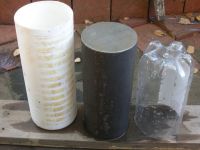
This close-up shows a bird shape in surface after vinegar and wire brushing.
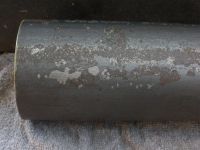
Then I broke through a solid region of black scale in about 20 places by hitting it with the back of a handsaw.
Next, mixed 1 part of muriatic acid with 4 parts of water. Covered the workpiece with half of the dilute acid. When I had to leave after about 50 minutes, there were loose black flakes in the acid. I temporarily stored the bar under water in a bucket. Later, after wire brushing, it was in this state:
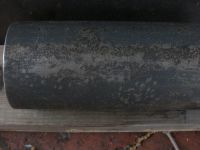
After another hour or so in the same partly-depleted acid, the visible end of the bar was covered with tiny bubbles. After rinsing and scrubbing, the cylindrical surface near that end looked scale-free.
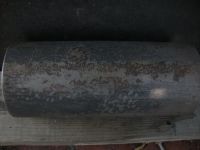
The bar rested for a few more hours in the bucket of water, before a two-hour soak in fresh acid. Then rinse, scrub, and neutralize overnight in straight household ammonia. Here's how it looked this morning, next to both batches of spent acid.
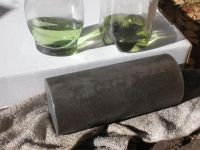
One patch of black remains, perhaps where the work had been touching the tank wall.
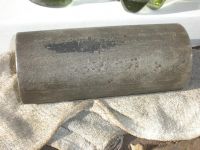
It's worth noting that the water in storage bucket turned from black to brown overnight. Did the suspended black particles settle, or change to a different oxide of iron?
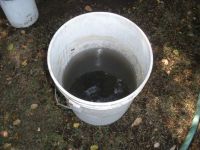
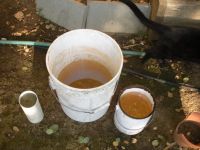
klugesmith, Tue Jul 28 2015, 12:07AM
Thanks for the tips.
I'm happy to report that pole piece 1 lost almost all of its black scale, and maybe a little bit of steel, after room-temperature soaks in vinegar & then dilute HCl. Got a story and a slide show about it. Should I repeat the successful process on pole piece 2, or try H2SO4?
Here is part 1 with its pickling tank and lid, after an overnight soak in vinegar. The tank (a 32 oz floor-wax bottle) fits so closely that 4 fl oz (120 ml) of liquid is enough to submerge the workpiece. SOF! Vinegar had turned some ordinary rust on the machined surface into a slime that could be wiped away with a fingertip.

This close-up shows a bird shape in surface after vinegar and wire brushing.

Then I broke through a solid region of black scale in about 20 places by hitting it with the back of a handsaw.
Next, mixed 1 part of muriatic acid with 4 parts of water. Covered the workpiece with half of the dilute acid. When I had to leave after about 50 minutes, there were loose black flakes in the acid. I temporarily stored the bar under water in a bucket. Later, after wire brushing, it was in this state:

After another hour or so in the same partly-depleted acid, the visible end of the bar was covered with tiny bubbles. After rinsing and scrubbing, the cylindrical surface near that end looked scale-free.

The bar rested for a few more hours in the bucket of water, before a two-hour soak in fresh acid. Then rinse, scrub, and neutralize overnight in straight household ammonia. Here's how it looked this morning, next to both batches of spent acid.

One patch of black remains, perhaps where the work had been touching the tank wall.

It's worth noting that the water in storage bucket turned from black to brown overnight. Did the suspended black particles settle, or change to a different oxide of iron?


Re: DIY pickling of steel?
Ash Small, Tue Jul 28 2015, 01:53AM
Might be worth heating the vinegar, the problems I read about with HCL and H2SO4 is reduction in size of workpiece.
I also read that all other acids apart from HCL need heating.
It may be too much to expect vinegar to remove black scale, it was a metalwork forum I found that link on, not a foundry site, but if it can get underneath the scale and is rejuvenated when depleted (volume of acid wasn't large in your floor wax bottle) and heated , given sufficient time, it may remove the scale without reduction in size of the workpiece.
Ash Small, Tue Jul 28 2015, 01:53AM
Might be worth heating the vinegar, the problems I read about with HCL and H2SO4 is reduction in size of workpiece.
I also read that all other acids apart from HCL need heating.
It may be too much to expect vinegar to remove black scale, it was a metalwork forum I found that link on, not a foundry site, but if it can get underneath the scale and is rejuvenated when depleted (volume of acid wasn't large in your floor wax bottle) and heated , given sufficient time, it may remove the scale without reduction in size of the workpiece.
Re: DIY pickling of steel?
Hazmatt_(The Underdog), Tue Jul 28 2015, 03:05AM
If you want it to shine, you're going to have to polish it. From the looks of it, it's already pretty clean. If you require further cleaning, then I'd say you're looking at several hours with the 600 grit sand paper, and a lot of buffing with coarse buffing compound.
Hazmatt_(The Underdog), Tue Jul 28 2015, 03:05AM
If you want it to shine, you're going to have to polish it. From the looks of it, it's already pretty clean. If you require further cleaning, then I'd say you're looking at several hours with the 600 grit sand paper, and a lot of buffing with coarse buffing compound.
Re: DIY pickling of steel?
johnf, Tue Jul 28 2015, 06:52AM
You can jazz up the acid whatever its is by putting in hydrogen peroxide into the acid.
I do this with HCL to clean substrates before ion implantation heating the acid mix also speeds it up
johnf, Tue Jul 28 2015, 06:52AM
You can jazz up the acid whatever its is by putting in hydrogen peroxide into the acid.
I do this with HCL to clean substrates before ion implantation heating the acid mix also speeds it up
Re: DIY pickling of steel?
Bored Chemist, Tue Jul 28 2015, 06:43PM
The trouble with adding peroxide is that it will increase the rate of etching of the metal.
Bored Chemist, Tue Jul 28 2015, 06:43PM
The trouble with adding peroxide is that it will increase the rate of etching of the metal.
Re: DIY pickling of steel?
klugesmith, Thu Jul 30 2015, 11:05PM
For safe mixing, do you add acid to peroxide or peroxide to acid?
I tried sulfuric acid on a small section of the same material. The acid is sold for unclogging drains, and might include inhibitors to reduce the etching of exposed iron. After 5- and 15-minute dips, I left the work overnight in a 1:1 mixture of acid and water. Outdoors, with no heating of my soft plastic containment vessel.
Behavior was consistent with most references on the Internet. H2SO4 does not dissolve scale, but needs to get underneath it (through cracks) and etch the interface to release the scale. The workpiece ended up with blistered scale, and I popped the blisters by peening with a hammer. Here's the result:
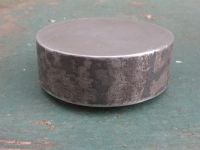
Reduction in diameter was about 0.004", which could be just from losing the scale's thickness.
I think I'll do the second 7-inch-long bar like the first, with hydrochloric acid, but pay more attention to before-and-after dimensions.
Sulfuric acid might be a way to dispose of leftover pills (prescription medication), which is not supposed to be put into the sanitary sewer system or the regular garbage stream. I don't know what they do with stuff turned in at medication drop-off sites. But right now, on my patio, one could find heavy pulverizing pestles and very strong chemical digesting agents.
klugesmith, Thu Jul 30 2015, 11:05PM
For safe mixing, do you add acid to peroxide or peroxide to acid?

I tried sulfuric acid on a small section of the same material. The acid is sold for unclogging drains, and might include inhibitors to reduce the etching of exposed iron. After 5- and 15-minute dips, I left the work overnight in a 1:1 mixture of acid and water. Outdoors, with no heating of my soft plastic containment vessel.
Behavior was consistent with most references on the Internet. H2SO4 does not dissolve scale, but needs to get underneath it (through cracks) and etch the interface to release the scale. The workpiece ended up with blistered scale, and I popped the blisters by peening with a hammer. Here's the result:

Reduction in diameter was about 0.004", which could be just from losing the scale's thickness.
I think I'll do the second 7-inch-long bar like the first, with hydrochloric acid, but pay more attention to before-and-after dimensions.
Sulfuric acid might be a way to dispose of leftover pills (prescription medication), which is not supposed to be put into the sanitary sewer system or the regular garbage stream. I don't know what they do with stuff turned in at medication drop-off sites. But right now, on my patio, one could find heavy pulverizing pestles and very strong chemical digesting agents.
Re: DIY pickling of steel?
klugesmith, Sun Aug 09 2015, 04:57PM
OK, time to close the book on this episode. At least until the missing steel 1x4 bars turn up.
The second pole piece is a twin of the first. Most of its scale was gone after two 1-hour sessions with occasional agitation (by squeezing the sides of the tank) and with fresh 1:4 diluted HCl for each session. Remember, there's not much acid volume compared to the workpiece surface area. It was good enough for me to proceed with neutralization and painting. The small holes are the subject of a different story.
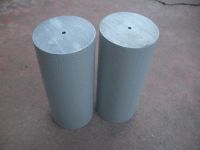
Also I used the sulfuric acid to digest some leftover isosorbide mononitrate and prochlorperazine tablets, after pulverizing them with a thick steel roller. Some white material (inert mineral filler?) would not dissolve until I added water. Initially in very small portions, while wearing safety glasses, while stirring vigorously, and allowing to cool between portions. I'm sure there was no pharmaceutical activity left when they went down the drain.
But this was a big waste of time. The authorities here recommend that leftover medicine (with a few exceptions) be disposed of with regular garbage, in closed containers. The special considerations are to prevent diversion. Use unmarked containers, mix pills with water, put unpalatable stuff in with them, etc. I have a regular supply of turds from the cat pictured in this thread.
klugesmith, Sun Aug 09 2015, 04:57PM
OK, time to close the book on this episode. At least until the missing steel 1x4 bars turn up.
The second pole piece is a twin of the first. Most of its scale was gone after two 1-hour sessions with occasional agitation (by squeezing the sides of the tank) and with fresh 1:4 diluted HCl for each session. Remember, there's not much acid volume compared to the workpiece surface area. It was good enough for me to proceed with neutralization and painting. The small holes are the subject of a different story.

Also I used the sulfuric acid to digest some leftover isosorbide mononitrate and prochlorperazine tablets, after pulverizing them with a thick steel roller. Some white material (inert mineral filler?) would not dissolve until I added water. Initially in very small portions, while wearing safety glasses, while stirring vigorously, and allowing to cool between portions. I'm sure there was no pharmaceutical activity left when they went down the drain.
But this was a big waste of time. The authorities here recommend that leftover medicine (with a few exceptions) be disposed of with regular garbage, in closed containers. The special considerations are to prevent diversion. Use unmarked containers, mix pills with water, put unpalatable stuff in with them, etc. I have a regular supply of turds from the cat pictured in this thread.
Re: DIY pickling of steel?
Conundrum, Mon Aug 17 2015, 05:27AM
Apparently out of date aspirin contains a very strong acid (salicylic) and can be used to juice up PCB etching as well as enable good even plating on tin plate solution.
I noticed that some white wine and colored vinegar has an additive in it that ruins etching somehow, the fix for this is to use cheap white vinegar
Conundrum, Mon Aug 17 2015, 05:27AM
Apparently out of date aspirin contains a very strong acid (salicylic) and can be used to juice up PCB etching as well as enable good even plating on tin plate solution.
I noticed that some white wine and colored vinegar has an additive in it that ruins etching somehow, the fix for this is to use cheap white vinegar

Re: DIY pickling of steel?
Bored Chemist, Mon Aug 17 2015, 05:32PM
In the ordinary course of events, medication is almost always disposed of via the sewers- think about it; where else is it going to end up?.
Salicylic acid isn't very strong in absolute terms, but it' not bad for an organic acid.
Pulverising organic nitrates is likely to win you a Darwin award. Thankful, the ones used as drugs are normally diluted with something fairly inert.
It's more than likely that the sulphuric acid had no significant effect of the Prochlorperazine; but you probably put anyone off stealing it.
Bored Chemist, Mon Aug 17 2015, 05:32PM
In the ordinary course of events, medication is almost always disposed of via the sewers- think about it; where else is it going to end up?.
Salicylic acid isn't very strong in absolute terms, but it' not bad for an organic acid.
Pulverising organic nitrates is likely to win you a Darwin award. Thankful, the ones used as drugs are normally diluted with something fairly inert.
It's more than likely that the sulphuric acid had no significant effect of the Prochlorperazine; but you probably put anyone off stealing it.
Re: DIY pickling of steel?
klugesmith, Tue Aug 18 2015, 01:24AM
Thank you, BC, I know better now. Shouldn't've pretended to know what I was doing in that last experiment.
Of course most medicine in the sewage stream got there through ordinary toilet activity.
Re. Darwin: I knew that "ISMO" is taken for the same purpose as nitroglycerin. Never thought to see if part of a 20 mg tablet could be detonated with a hammer blow. Too late now! MSDS for the pure material
MSDS for the pure material  warns: "may explode by detonation, heat, or shock." Huh? How does something explode by detonation, as opposed to by heat or by shock?
warns: "may explode by detonation, heat, or shock." Huh? How does something explode by detonation, as opposed to by heat or by shock?
Since prochlorperazine is an oxygen-free molecule, I guess it can't be hydrolyzed or dehydrated by H2SO4. And, as you hinted, it's not unknown for druggies to abuse it.
How about if my penance is to to measure and report the specific gravity of the acidic drain opener? Good excuse to get into the glass hydrometer collection. Or a 50 ml volumetric flask and a weighing scale.
-Rich
klugesmith, Tue Aug 18 2015, 01:24AM
Thank you, BC, I know better now. Shouldn't've pretended to know what I was doing in that last experiment.
Of course most medicine in the sewage stream got there through ordinary toilet activity.
Re. Darwin: I knew that "ISMO" is taken for the same purpose as nitroglycerin. Never thought to see if part of a 20 mg tablet could be detonated with a hammer blow. Too late now!
 MSDS for the pure material
MSDS for the pure material  warns: "may explode by detonation, heat, or shock." Huh? How does something explode by detonation, as opposed to by heat or by shock?
warns: "may explode by detonation, heat, or shock." Huh? How does something explode by detonation, as opposed to by heat or by shock?Since prochlorperazine is an oxygen-free molecule, I guess it can't be hydrolyzed or dehydrated by H2SO4. And, as you hinted, it's not unknown for druggies to abuse it.
How about if my penance is to to measure and report the specific gravity of the acidic drain opener? Good excuse to get into the glass hydrometer collection. Or a 50 ml volumetric flask and a weighing scale.
-Rich
Re: DIY pickling of steel?
Bored Chemist, Tue Aug 18 2015, 09:20PM
How good is your balance?
And what you really neded isn't a flask, but one of these to go with it.

Even then you won't get a reliable answer because the acid will almost certainly contain other material- apart from water and acid.
The acid is almost certainly something like 95 +/- 5% which is not a bad level of imprecision.
If you really want to know the concentration, titrate it.

Bored Chemist, Tue Aug 18 2015, 09:20PM
How good is your balance?
And what you really neded isn't a flask, but one of these to go with it.

Even then you won't get a reliable answer because the acid will almost certainly contain other material- apart from water and acid.
The acid is almost certainly something like 95 +/- 5% which is not a bad level of imprecision.
If you really want to know the concentration, titrate it.

Re: DIY pickling of steel?
hen918, Wed Aug 19 2015, 04:56PM
As far as I know, the drain unblocker I have is 92% sulphuric, 8% water. I know many people use something similar for nitration so I think it's pretty additive free.
hen918, Wed Aug 19 2015, 04:56PM
As far as I know, the drain unblocker I have is 92% sulphuric, 8% water. I know many people use something similar for nitration so I think it's pretty additive free.
Re: DIY pickling of steel?
Hazmatt_(The Underdog), Thu Aug 20 2015, 12:25AM
No, if you dilute it, it has some kind of surfactant in it that causes frothing. Sulphuric Acid does not do that on its own. For our uses it's not a problem, but if you're doing any real lab work, it's not lab grade.
Hazmatt_(The Underdog), Thu Aug 20 2015, 12:25AM
No, if you dilute it, it has some kind of surfactant in it that causes frothing. Sulphuric Acid does not do that on its own. For our uses it's not a problem, but if you're doing any real lab work, it's not lab grade.
Print this page